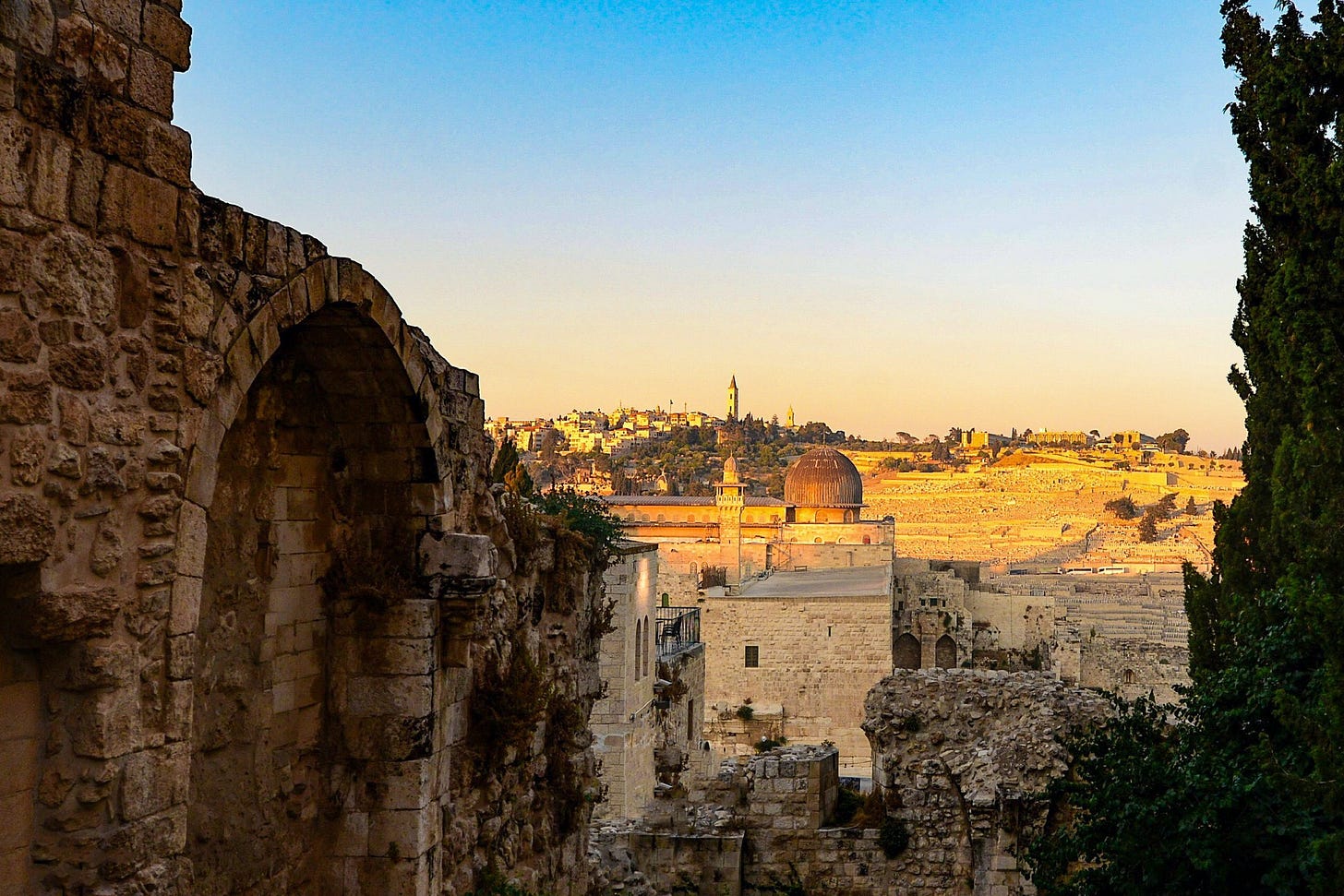The Pond Overfloweth
One year since October 7th.
As I write this, my heart breaks for Israel.
Someone once put the carnage of the American Civil War—some 600,000 killed from a population of thirty million—in perspective with three, potent words.
“Everyone knew someone.”
The same could be said of any small population but especially Israel’s. How many parents, siblings, spouses, friends, community and synagogue members know someone who disappeared on October 7th, 2023? I could well and rightly ask, does anyone in Israel, or among Jewish communities in America not know someone?
May all those who just celebrated a bittersweet Rosh Hashanah, and especially those who celebrated it in Southern Israel with empty seats at the table, be honored and blessed. With the hot war between Israel and Iran escalating on seven fronts, Jews, Muslims, Christians, Druze in Lebanon—all the millions displaced, evacuated, or sheltering in harm’s way, deserve as much prayer and support.
Still, to those who celebrated Rosh Hashanah, shana tovah!

One Year Later
One year from October 7th,—a day, like September 11th, and December 7th, 1941, that will live in infamy—Gaza is in ruins. After a year of dogged, tunnel to tunnel fighting, Hamas, who as I wrote one year ago, bears sole responsibility for the catastrophic suffering it brought upon Israel, the greater Middle East, and especially its own, beleaguered people, is nearly pulled up by the roots. In southern Lebanon, thanks to targeted airstrikes and a pager-exploding stunt that would make Q from James Bond proud, Hezbollah is headless.
Thanks to the hard work of the IDF, I’m not worried about a repeat of the rape and slaughter that tore through Southern Israel one year ago. Or, as things develop, the rockets that have rained down on its northern part and displaced the population there since October of last year. One year out, Israel—with some help from quibbling allies—is winning its fight for survival with admirable resolve, world opinion and the United Nations be damned.
Fighting now, and in such a way that limits civilian casualties while still exacting a high price from those who launch rockets at Israel’s cities or call in their charter for its destruction is some tightrope to walk. Benjamin Netanyahu may have skeletons in his closet, but under his leadership, Israel is walking it. All that to say, an armed, self-governing people are taking the necessary, if not sufficient steps to live safely in their ancient homeland, surrounded by hostility.
As the come-to-his-senses Senator John Fetterman continues to say, ‘Bully for them. Let’s support them unconditionally.’
He’s absolutely right.
After an October 7th and thousands of rockets, defeating and dismantling enemies on one’s doorstep is a course any reasonable country would take to defend its population. Rulers, Paul writes in Romans, and we can substitute sovereign nations, do not bear the sword in vain.
But the fight Israel did not start is far from over. In fact, most of its nine million inhabitants are barely done sheltering in place. Less than a week ago, Iran fired a second volley of two hundred missiles at Israel’s population centers. Again, and in less than a hundred years since six million European Jews perished in the Holocaust, Jewish survival hangs in the balance.
As Charles Krauthammer wrote for the National Review a few decades ago:
“Israel’s centrality is more than just a question of demography. It represents a bold and dangerous new strategy for Jewish survival.”1
Krauthammer’s frank analysis of that strategy is invigorating, even as it chills the spine.
“It was the right decision, the only possible decision. But oh so perilous. What a choice to make one’s final stand: a dot on the map, a tiny patch of near-desert, a thin ribbon of Jewish habitation behind the flimsiest of natural barriers (which the world demands Israel relinquish).
One determined tank thrust could tear it in half.
To destroy the Jewish people, Hitler needed to conquer the world. All that is needed today is to conquer a territory smaller than Vermont.”2
Krauthammer, of course, doesn’t factor in the God of Israel, or God’s promises to the patriarch Abraham in Genesis 12, 15, and 17.
The promise of Israel as a de facto homeland for Yahweh’s chosen people runs throughout the Old Testament and also throughout the language, symbols, and prophecies of the New Testament, God’s veritable Second Act.
I’ve more to say on that… but first, as Frank Costanza might say on Festivus, the airing of grievances.
Which Way, Based Christian?
I’m more worried for the West than I was one year ago. When I say ‘the West’ I mean the Anglophone countries (America, U.K., Australia, Canada, etc), Europe, broadly speaking, and of course, Israel.
The Ivy League protesting, Christian Nationalist-adjacent, cheering on-Nick Fuentes-from-Mom’s-basement claim that Israelis, or more bluntly, Jews, have no place in the West, their homeland, or anywhere else is one of the more nauseating, and yet unsurprising developments of this year. Different versions of this canard fixate on Jews for their race, their disproportionate success, or their historical opposition to Christianity, but they all boil them down to the same thing—parasites.
Nothing could be more despicable, demonstrably false, or puerile.
All that to say, and as Israel fights for survival, I’m worried for what that moral litmus test has revealed in us, both mainstream left, and not-so-fringe right.
To this sad, disgusting development, Douglas Murray could not be more eloquent. In an interview with journalist Bari Weiss, he laments the rise of the oldest, envy-ridden canard with a quote from T.S. Eliot. (If you watch the clip at the bottom, around minute 53)
‘We do not know very much of the future
Except that from generation to generation
The same things happen again and again.
Men learn little from others' experience.’
All things considered, Eliot is right.
For so many horrific lessons, and for one as graphic and unambiguous as October 7th, we learn little, indeed.
But believing as I do, in the God of Israel and his risen Son, I hang my hat on trust—trust in His promises, made to His people, thousands of years ago.
I make no claim that modern-day Israel is a theocratic, Heaven-reflecting state rather than an increasingly secular one. Neither do I bring this up to argue that Christians should support Israel on some kind of Biblical end-times or covenant-honoring basis. But while we need no religious reasons to support a productive, tolerant, peace-desiring people in a backward part of the world, the sheer history and connection to God’s Old Testament covenant and promise could not be more potent, if simply in a symbolic sense.
If those promises in Genesis remain in effect between God and His people (I know even a statement like that tramples through many religious studies gardens), then what is it to us?
Or rather, what if they are?
The fact that gentile’s like yours truly weren’t promised a homeland or descendants that will number the stars is beside all this—though if you think about it, that’s another pin jab in the Christian Nationalist’s inflatable foundation.
However we parse these connections, our prayers for the safety and peace of Jerusalem should come with confidence in God’s plans and sovereignty, here as much as anywhere. God swore on Himself that he’d keep his promises to Abraham—and for that reason alone, I’ll go so far as to say Jews and Christians have some basis for believing a theocratic terror state won’t fulfill its fantasy of wiping Israel off the map.
While that doesn’t mean Israelis should lay down their arms and sing ‘Kum-bay-yah’, it means we can prayerfully and actively support them as they fight for survival with profound hope and conviction. Said prayers go double for Israel’s salvation, for the veil, as it were, lifting from nine million eyes.
We can be all the more steadfast in our support because—and even with growing exceptions in places like West Africa—we Christians have the privilege of safety.
More and more, and even in Western cities, Jews do not.
That’s our clarion call to stand for them, to repeat Douglas Murray’s eloquent declaration that quotes the widow Ruth’s promise to her stepmother word for word:
‘Whither thou goest, I will go. And where thou lodgest, I will lodge. Thy people shall be my people and thy God my God.’ And I tell you this with utter certainty. If they keep coming for the Jews, they keep coming for you: I’ll tell you this. They may come for the Zionists. Very well. I am a Zionist.
They may keep coming for the Israelis. Very well. I’m an Israeli.
They may come continuously for the Jews. Very well. I’m a Jew.’
As am I.
As all of us, Christian or not, but especially Christian should be. Especially now.
Thanks for reading and please, please share.

Further Reading:
In City Journal, Eitan Fischberger explains how October 7th changed the world—not just the region. He succinctly argues that Israel’s fight on seven fronts is America’s fight as well the West’s.
Here’s his article: 365 Days of October 7
Further Listening:
Coming Up
A conversation with Dr. Neil Shenvi, Christian apologist, classical educator, and author of ‘Why Believe’
I’m excited for this one.
Charles Krauthammer. From his essay ‘At Last, Zion.’ Published in ‘The Weekly Standard: A Reader.’ pages 222 - 236.
Charles Krauthammer. ‘At Last, Zion.’






If you're reading this, there's some corrections I made from the version that emailed.
1. Lebanese Druze are not 'Druze Christians.'
Without getting too into the weeds, they are a syncretic blend of Abrahamic and other monotheistic faiths that developed under a sect of Shia Islam, with Arab language and culture.
2. I included a small section that clarifies something -- I don't see modern-day Israel as a theocratic state under the same covenant with God as ancient Israel. Clearly, Israel is a modern, secular state. What I was trying to say initially (sometimes it takes more than one try), is that the OT connection to Israel, and in particular, God's promises to Abraham in Genesis add an element of wonder, symbolic poignancy, and for Christians, trust in God's plan for the Jewish people, more than half of whom now live in their ancient homeland. I'm also not saying that the state of Israel is direct prophet fulfillment, though it very well could be.
3. Christians are not obligated to support Israel's war efforts for Biblical reasons; they are obligated because Israel's defensive war against aggressors who want their destruction is clear, moral/ethical, and necessary. With Oct 7th and Iran's missile barrage, that moral dimension, though not a carte blanche justification for anything Israel could ever do, should be clearer than ever.
Hope that helps -- and thank you to readers who emailed me and pointed out that I should address these areas.